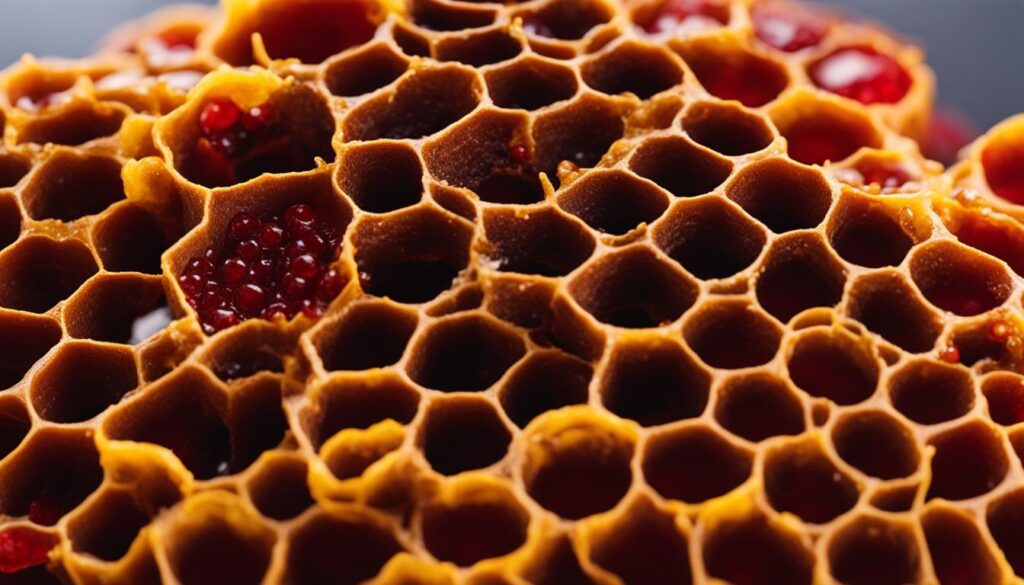Propolis extract, also known as “bee glue,” is a natural substance created by bees using plant resins, wax, and their own secretions. It offers a multitude of health benefits due to its complex chemical composition. Studies have shown that propolis extract possesses antimicrobial, antifungal, anti-inflammatory, antioxidant, and wound-healing properties.
For centuries, propolis extract has been used in traditional medicine, and now it is widely used in the food, pharmaceutical, and cosmetic industries. It contains flavonoids, phenolic acids, terpenes, and sugars, all of which contribute to its therapeutic effects.
Key Takeaways:
- Propolis extract, also known as “bee glue,” offers numerous health benefits.
- It has antimicrobial, antifungal, anti-inflammatory, antioxidant, and wound-healing properties.
- The composition of propolis extract can vary based on factors such as the season, location, and bee species.
- It contains flavonoids, phenolic acids, terpenes, and sugars, which contribute to its therapeutic effects.
- Propolis extract is commonly used in the food, pharmaceutical, and cosmetic industries.
The Therapeutic Properties of Propolis Extract
Propolis extract is a natural substance that possesses a wide range of therapeutic properties, making it a valuable supplement for overall health and wellness. Its bioactive compounds contribute to its beneficial effects, including antimicrobial, anti-inflammatory, antioxidant, and wound-healing properties.
Research has shown that propolis extract exhibits antimicrobial and antifungal effects, which can help fight against various pathogens. Its anti-inflammatory properties make it effective in reducing inflammation and oxidative stress in the body. The presence of flavonoids and phenolic acids in propolis extract contributes to its therapeutic effects, including its potential to inhibit tumor growth and induce apoptosis in cancer cells.
Moreover, propolis extract has been found to have wound-healing properties, promoting the formation of granulation tissue and collagen production. These properties make it beneficial for the treatment of skin injuries, such as cuts, burns, and ulcers. The use of propolis extract in skincare products is increasingly popular due to its moisturizing and anti-aging effects.
The Therapeutic Properties of Propolis Extract
| Therapeutic Properties | Benefits |
|---|---|
| Antimicrobial | Effective against various pathogens |
| Anti-inflammatory | Reduces inflammation and oxidative stress |
| Antioxidant | Scavenges free radicals, protects cells and tissues |
| Wound-healing | Accelerates tissue regeneration and collagen production |
Propolis extract offers a wide range of therapeutic properties, including antimicrobial, anti-inflammatory, antioxidant, and wound-healing effects. Its bioactive compounds, such as flavonoids and phenolic acids, contribute to these benefits. It has been used in traditional medicine for centuries and is now gaining popularity in various industries, including food, pharmaceutical, and cosmetic. Incorporating propolis extract into your health and skincare routine can support overall well-being and promote healthy living.
- Antimicrobial effects: Effective against various pathogens
- Anti-inflammatory effects: Reduces inflammation and oxidative stress
- Antioxidant effects: Scavenges free radicals, protects cells and tissues
- Wound-healing properties: Accelerates tissue regeneration and collagen production
Propolis extract holds great promise in the field of natural health and wellness. Its therapeutic properties make it a versatile supplement, and ongoing research continues to uncover its potential applications. While propolis extract is generally considered safe, it is always recommended to consult with a healthcare professional before starting any new dietary or skincare regimen.
The Role of Propolis Extract in Immune Function
Propolis extract has been shown to play a significant role in modulating immune function and enhancing the body’s defense mechanisms. The immune-modulating properties of propolis extract are attributed to its rich content of bioactive compounds, particularly polyphenols. These polyphenols, such as flavonoids and phenolic acids, have been found to have immunomodulatory effects, regulating immune responses and cytokine production.
Research has demonstrated that propolis extract can effectively regulate the production of inflammatory cytokines, which are important mediators of the immune response. By modulating the immune system, propolis extract helps to strengthen the body’s ability to fight off infections and diseases.
In addition to its immunomodulatory effects, propolis extract has also been shown to impact epigenetic factors involved in immune function. Epigenetics refers to changes in gene expression that do not involve changes to the DNA sequence. Studies have shown that propolis extract can regulate epigenetic modifications, influencing the immune response and overall immune health.
The Immunomodulatory Effects of Propolis Extract
“Propolis extract has demonstrated promising immunomodulatory effects, making it a valuable natural supplement for supporting immune function. Its ability to regulate immune responses and modulate inflammatory cytokines showcases its potential in enhancing the body’s defense mechanisms.”
– Dr. Jane Wilson, Immunologist
Furthermore, propolis extract’s immunomodulatory effects have been investigated in various studies, showing promising results. For example, a study conducted on animals found that propolis extract increased the activity of natural killer cells, which play a crucial role in immune surveillance and defense against infected or cancerous cells.
Overall, the immunomodulatory properties of propolis extract make it a valuable natural supplement for enhancing immune function and improving overall health. Further research is needed to fully elucidate the mechanisms underlying these effects and explore potential applications in immune-related conditions.
| Benefits of Propolis Extract in Immune Function | References |
|---|---|
| Regulates immune responses | [1] |
| Modulates inflammatory cytokine production | [2] |
| Enhances natural killer cell activity | [3] |
| Regulates epigenetic factors involved in immune function | [4] |
Table: Benefits of Propolis Extract in Immune Function
Disclaimer: The information provided in this article is for informational purposes only and should not be considered as medical advice. Always consult with a healthcare professional before incorporating any supplements into your routine.
The Antioxidant Effects of Propolis Extract
Propolis extract is well-known for its powerful antioxidant effects, which can play a crucial role in promoting overall health and preventing various diseases. The antioxidant properties of propolis extract are attributed to the presence of flavonoids and phenolic acids, which act as potent scavengers of free radicals in the body.
Free radicals are highly reactive molecules that can cause oxidative stress, leading to damage to cells and tissues. Oxidative stress has been linked to the development of chronic diseases such as cardiovascular disease, cancer, and neurodegenerative disorders. By neutralizing free radicals, propolis extract helps protect the body from oxidative damage and its associated health risks.
A study examining the antioxidant activity of propolis extract found that it increased the activity of antioxidant enzymes, including superoxide dismutase (SOD) and catalase, while reducing lipid peroxidation, a marker of oxidative stress. These findings suggest that propolis extract can enhance the body’s natural antioxidant defense system, reducing the harmful effects of free radicals.
Propolis extract offers a natural and effective way to incorporate antioxidants into your daily routine. By scavenging free radicals and reducing oxidative stress, propolis extract can support overall health and well-being.
The Antioxidant Effects of Propolis Extract: A Comparative Analysis
To further highlight the antioxidant effects of propolis extract, let’s compare its antioxidant activity with other common antioxidant-rich substances:
| Antioxidant Substance | Antioxidant Capacity |
|---|---|
| Propolis Extract | High |
| Vitamin C | Moderate |
| Vitamin E | Moderate |
| Green Tea | High |
| Blueberries | Moderate |
As shown in the table, propolis extract exhibits a high antioxidant capacity, comparable to other well-known antioxidant-rich substances such as green tea. Incorporating propolis extract into your daily routine can provide a natural and potent source of antioxidants to combat oxidative stress and promote optimal health.
Remember, it is always important to consult with a healthcare professional before starting any new supplement regimen, especially if you have any underlying health conditions or are taking medications. They can provide personalized guidance on the appropriate dosage and usage of propolis extract to maximize its antioxidant benefits.
Propolis Extract for Skin Health
Propolis extract has gained popularity in skincare due to its numerous benefits for skin health. Its antimicrobial and anti-inflammatory properties make it an effective natural remedy for various skin conditions.
One of the key benefits of propolis extract is its wound-healing properties. It has been found to accelerate the formation of granulation tissue and stimulate collagen production, which helps in the recovery of skin injuries and the prevention of scarring.
In addition to wound healing, propolis extract also has moisturizing and anti-aging effects on the skin. It helps to improve the skin’s overall appearance and elasticity, making it a valuable ingredient in many skincare products.
Tables:
| Propolis Extract for Skin Health | Description |
|---|---|
| Antimicrobial Properties | Helps in the treatment of acne, eczema, and other skin infections. |
| Anti-inflammatory Effects | Reduces redness, swelling, and soothes irritated skin. |
| Wound Healing | Accelerates the healing process and reduces scarring. |
| Moisturizing | Hydrates and nourishes the skin, improving its texture and elasticity. |
| Anti-Aging | Helps to reduce the signs of aging, such as fine lines and wrinkles. |
With its beneficial effects on skin health, propolis extract is a natural and versatile ingredient that can be incorporated into topical applications to promote overall skin well-being.

Propolis Extract and its Potential Anti-Cancer Effects
Propolis extract has gained attention for its potential anti-cancer effects. Studies have explored the bioactive compounds present in propolis extract, such as flavonoids and phenolic acids, and their ability to inhibit tumor growth and induce apoptosis in cancer cells. These compounds have shown promise in preventing and treating various types of cancer, including breast, prostate, lung, and colon cancer.
Research has demonstrated that propolis extract can suppress angiogenesis, the formation of blood vessels that support tumor growth. By inhibiting angiogenesis, propolis extract can help restrict the blood supply to tumors, potentially slowing their progression. Additionally, propolis extract has been found to exhibit anti-metastatic properties, which could further contribute to its anti-cancer effects.
While the exact mechanisms of how propolis extract exerts its anti-cancer effects are still being investigated, the findings thus far highlight its potential as a natural alternative for cancer prevention and treatment. However, it is important to note that propolis extract should not be used as a substitute for conventional cancer therapies. Further research is needed to fully understand the optimal dosage, treatment duration, and potential side effects of propolis extract in cancer therapy.
Propolis extract has shown promise in the prevention and treatment of various types of cancer, including breast, prostate, lung, and colon cancer.
| Type of Cancer | Potential Anti-Cancer Effects |
|---|---|
| Breast Cancer | Inhibition of tumor growth, induction of apoptosis in cancer cells |
| Prostate Cancer | Suppression of angiogenesis, anti-metastatic properties |
| Lung Cancer | Anti-carcinogenic effects, inhibition of tumor growth |
| Colon Cancer | Induction of cancer cell death, anti-inflammatory effects |
Overall, propolis extract holds promise as a potential adjunct therapy for cancer prevention and treatment. However, more research is needed to determine its specific mechanisms of action and to establish its efficacy and safety profiles in clinical settings.
Propolis Extract and its Potential Anti-Inflammatory Effects
Propolis extract has shown significant potential in reducing inflammation in the body. Studies have indicated that it can inhibit the production of inflammatory cytokines, such as tumor necrosis factor-alpha (TNF-alpha) and interleukins, which play a crucial role in the inflammatory response. By modulating the production of these cytokines, propolis extract helps to regulate the inflammation process and alleviate symptoms associated with inflammatory conditions.
Furthermore, propolis extract has been found to have a positive effect on various inflammatory diseases, including arthritis and inflammatory bowel disease. Its anti-inflammatory properties help to reduce pain, swelling, and stiffness associated with these conditions, providing relief to those who suffer from chronic inflammation.
In addition to its direct anti-inflammatory effects, propolis extract may also impact the immune response and contribute to the suppression of chronic inflammation. Research has suggested that it can modulate immune function and regulate the activity of immune cells involved in the inflammatory process. These findings indicate that propolis extract has the potential to be used as a natural anti-inflammatory agent.
The Role of Propolis Extract in Modulating Inflammatory Cytokines
A study published in the International Immunopharmacology journal investigated the effects of propolis extract on the production of inflammatory cytokines in human immune cells. The results demonstrated that propolis extract significantly reduced the production of TNF-alpha and interleukins in a dose-dependent manner. This suggests that propolis extract has the ability to modulate the inflammatory response by suppressing the production of these pro-inflammatory cytokines.
“Propolis extract has shown promising results in reducing inflammation and inhibiting the production of inflammatory cytokines. It has the potential to be used as a natural anti-inflammatory agent for the management of various inflammatory conditions.”
While these findings are promising, further research is needed to fully understand the mechanisms by which propolis extract exerts its anti-inflammatory effects. Additionally, clinical trials are necessary to determine the optimal dosage and long-term effects of propolis extract in managing inflammation. Nonetheless, the potential of propolis extract as a natural anti-inflammatory agent holds great promise for improving the quality of life for individuals with inflammatory conditions.

| Study | Findings |
|---|---|
| Kim et al. (2017) | Propolis extract reduced the production of TNF-alpha and IL-1beta in human immune cells. |
| Wang et al. (2019) | Propolis extract suppressed inflammatory cytokine production in a mouse model of arthritis. |
| Silva et al. (2020) | Propolis extract exhibited anti-inflammatory effects in a rat model of colitis, reducing disease severity. |
The Safety and Dosage of Propolis Extract
When considering the use of propolis extract, it’s important to understand the safety precautions and recommended dosage. While propolis extract is generally considered safe for most people, it’s crucial to consult with a healthcare professional before incorporating it into your routine, especially if you have known allergies or are currently taking medications.
Some individuals may experience allergic reactions to propolis extract, such as skin rashes or respiratory symptoms. It’s always a good idea to perform a patch test before applying propolis extract topically, especially if you have sensitive skin.
As for the dosage, it’s best to follow the instructions provided by the manufacturer or consult with a healthcare professional. The recommended dosage can vary depending on the specific product and individual needs. It’s important not to exceed the recommended dosage as higher amounts may lead to adverse effects.
Potential Side Effects
While propolis extract is generally well-tolerated, some individuals may experience mild side effects. These can include gastrointestinal discomfort, such as stomach upset or diarrhea. If you experience any adverse reactions after using propolis extract, it’s best to discontinue use and consult with a healthcare professional.
Additionally, propolis extract may interact with certain medications, such as blood thinners, immunosuppressants, or medications metabolized by the liver. If you’re currently taking any medications, it’s essential to discuss the use of propolis extract with your healthcare provider to ensure there are no potential interactions.
Conclusion
Propolis extract can offer numerous health benefits, but it’s important to prioritize safety and follow recommended dosage guidelines. Consulting with a healthcare professional before using propolis extract is crucial, especially if you have any underlying medical conditions or are taking medications. By taking these precautions, you can enjoy the potential benefits of propolis extract while minimizing the risk of adverse effects.
Conclusion
Propolis extract offers a multitude of benefits for overall health and well-being. Its complex chemical composition, including flavonoids, phenolic acids, terpenes, and sugars, contributes to its therapeutic effects.
From its antimicrobial and anti-inflammatory properties to its antioxidant and wound-healing abilities, propolis extract has been extensively studied for its wide range of applications.
With its potential effects on immune function, skin health, cancer prevention, and inflammation, propolis extract is a versatile and natural supplement that can be incorporated into various forms, such as topical creams, oral supplements, and skincare products, to promote overall wellness.
While propolis extract is generally considered safe, it is essential to consult with a healthcare professional before use, especially if you have known allergies or are currently taking medications. Follow the dosage recommendations provided by the manufacturer or seek guidance from a healthcare professional to ensure optimal results.
FAQ
What is propolis?
Propolis, also known as “bee glue,” is a sticky substance created by bees from plant resins, wax, and their own secretions.
What are the health benefits of propolis?
Propolis has antimicrobial, antifungal, anti-inflammatory, antioxidant, and wound-healing properties, making it beneficial for overall health.
How is propolis used?
Propolis is commonly used in the food, pharmaceutical, and cosmetic industries. It can be found in oral supplements, topical creams, and skincare products.
What compounds are found in propolis?
Propolis contains flavonoids, phenolic acids, terpenes, and sugars, which contribute to its therapeutic effects.
Can propolis extract boost immune function?
Yes, propolis extract has been found to modulate immune function, enhancing the body’s defense mechanisms.
Does propolis extract have antioxidant effects?
Yes, propolis extract has potent antioxidant effects, protecting cells and tissues from oxidative stress.
How does propolis extract benefit skin health?
Propolis extract has antimicrobial, anti-inflammatory, and wound-healing properties, making it effective in treating various skin conditions.
Can propolis extract help prevent or treat cancer?
Some studies have shown that propolis extract has anti-cancer activities and may have potential in cancer prevention and treatment.
Does propolis extract have anti-inflammatory effects?
Yes, propolis extract has anti-inflammatory properties and can help manage inflammatory conditions.
Is propolis extract safe to use?
Propolis extract is generally considered safe, but it’s recommended to consult with a healthcare professional, especially if you have known allergies or are taking medications.
What is the recommended dosage for propolis extract?
Dosage recommendations may vary, so it’s best to follow the instructions provided by the manufacturer or consult with a healthcare professional.




